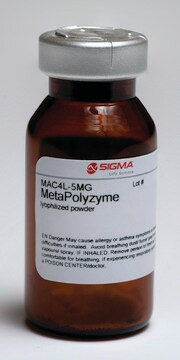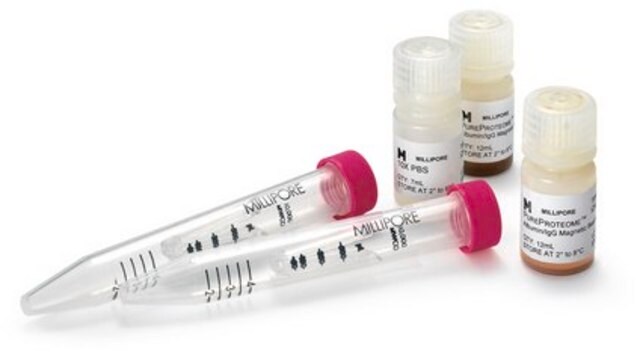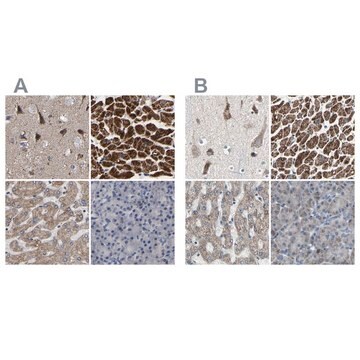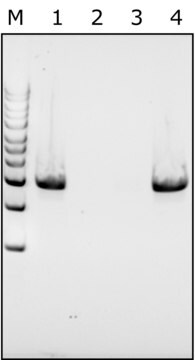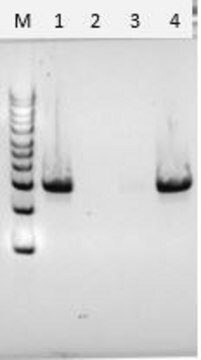MAC4LRI
MetaPolyzyme with RNase inhibitor
Lytic enzyme mixture for RNA extraction
Sinônimo(s):
Multilytic Enzyme Mix suitable for RNA isolation
Faça loginpara ver os preços organizacionais e de contrato
About This Item
Código UNSPSC:
12352204
Produtos recomendados
Nível de qualidade
Formulário
lyophilized powder
técnica(s)
DNA extraction: suitable
adequação
suitable for microbiology
aplicação(ões)
microbiology
Condições de expedição
wet ice
temperatura de armazenamento
-10 to -25°C
Descrição geral
A common difficulty among microbiome scientists is to extract nucleic acids from difficult to lyse microbes that form capsules or highly resistant spores. Some microbes are difficult to disrupt because the cell walls may form capsules or resistant spores. To address this challenge, protocols that integrate lysing enzymes can be incorporated into the nucleic acid extraction workflow.
Aplicação
Isolating RNA from microbiome samples poses many challenges. RNA molecules are highly labile and are prone to degradation by contaminating RNases. As such, to adapt the MetaPolyzyme for RNA isolation, a broad range RNase inhibitor has been incorporated in order to help prevent RNA degradation by various RNases. MAC4LRI, includes all 6 enzymes from MetaPolyzyme to ensure maximal lysis of microorganisms while protecting the sample RNA from degradation. While it is not possible to inhibit all RNases from a specific microbial environment, we haver incorporated a proprietary RNase Inhibitor to help inhibit as many RNases as possible.
The MetaPolyzyme product family includes MAC4L, MAC4LDF (DNA-Free), SAEO200 (MycoPolyzme, for yeast and fungal lysis, DNA-Free) and MAC4LRI (RNase Inhibitor) and are based on a multi-lytic enzyme mixture formulated for effective lysis of microbiome samples from any sample type. Originally, MetaPolyZyme was developed by Scott Tighe for use on samples from extreme environments and general applications to increase DNA extraction efficiency for any method. To date, these products have been further evaluated and continuously developed in consultation and collaboration with the Association of Biomolecular Resource Facilities (ABRF) Metagenomics and Microbiome Research Group (MMRG; formerly the Metagenomics Research Group, MGRG). Several publications have cited use of MetaPolyzyme, suggesting various advantages to the usage of MetaPolyzyme for enhancing bacterial lysis.
The MetaPolyzyme product family includes MAC4L, MAC4LDF (DNA-Free), SAEO200 (MycoPolyzme, for yeast and fungal lysis, DNA-Free) and MAC4LRI (RNase Inhibitor) and are based on a multi-lytic enzyme mixture formulated for effective lysis of microbiome samples from any sample type. Originally, MetaPolyZyme was developed by Scott Tighe for use on samples from extreme environments and general applications to increase DNA extraction efficiency for any method. To date, these products have been further evaluated and continuously developed in consultation and collaboration with the Association of Biomolecular Resource Facilities (ABRF) Metagenomics and Microbiome Research Group (MMRG; formerly the Metagenomics Research Group, MGRG). Several publications have cited use of MetaPolyzyme, suggesting various advantages to the usage of MetaPolyzyme for enhancing bacterial lysis.
Características e benefícios
- Disrupts difficult to lyse microbe samples
- Protects RNA from degradation
Palavra indicadora
Danger
Frases de perigo
Declarações de precaução
Classificações de perigo
Resp. Sens. 1
Código de classe de armazenamento
11 - Combustible Solids
Classe de risco de água (WGK)
WGK 3
Ponto de fulgor (°F)
Not applicable
Ponto de fulgor (°C)
Not applicable
Escolha uma das versões mais recentes:
Certificados de análise (COA)
Lot/Batch Number
Lamentamos, não temos COA para este produto disponíveis online no momento.
Se precisar de ajuda, entre em contato Atendimento ao cliente
Já possui este produto?
Encontre a documentação dos produtos que você adquiriu recentemente na biblioteca de documentos.
Nossa equipe de cientistas tem experiência em todas as áreas de pesquisa, incluindo Life Sciences, ciência de materiais, síntese química, cromatografia, química analítica e muitas outras.
Entre em contato com a assistência técnica
